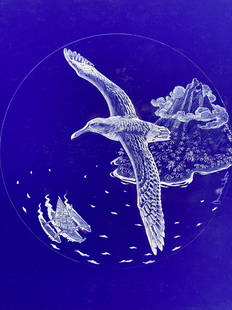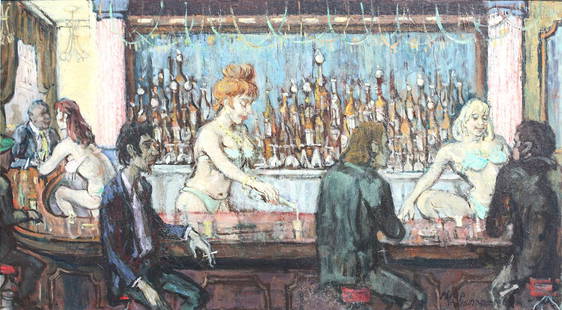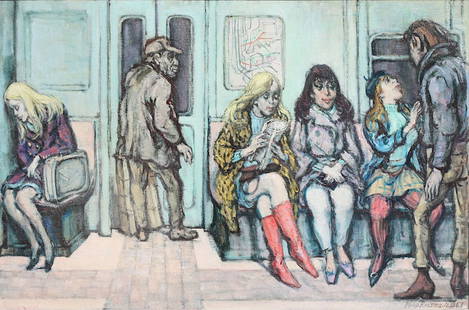
WALTON FORD (B. 1960) Moksha, 1997
Walton Ford Sale History
View Price Results for Walton Ford
Related Paintings
More Items from Walton Ford
View MoreRecommended Art
View More





Item Details
Description
WALTON FORD (B. 1960)
Moksha, 1997
signed, titled and dated 'Moksha - Walton Ford 1997' (on the reverse)
oil on panel
63 x 46in (160 x 46cm)
Footnotes:
Provenance
The Artist.
Paul Kasmin Gallery, New York.
Acquired directly from the above by the present owner.
Literature
Walton Ford, Pancha Tantra, Köln, Taschen GmbH, 2009, p. 63, illustrated.
The work of Walton Ford is hard to miss. No matter our station or current preoccupation, the raw vivacity of the natural world has a certain allure, and Ford's paintings and watercolors blow on the embers of our fascination with flora and fauna. The surface of his works are engaging, beckoning us to examine the wing of an eagle or the scales of a rattlesnake in minute detail lest we miss a single color or brushstroke. However, unlike the work of the artist he is most often compared to, John James Audubon, Walton Ford's oeuvre sinks beneath the surface of the physiology of the animal kingdom, exploring the depths of our complicated relationship with racism, capitalism, and the environmental and social colonialism that is our Western birthright. Using 18th and 19th century techniques and pictorial motifs from landscape and nature painting, Ford transforms ethological studies into biting societal and historical commentaries.
Walton Ford's practice shines a light on the darkness that hovers along the edges of our own Western history and expansion, themes that intertwine natural and societal issues. His earliest series of nature paintings, The Body Remembers, explore the history of Ford's Southern roots as recounted in old family writings, memoirs of antebellum pride whose orals recollections had been whitewashed to justify the horrors of slavery. A second body of work from the early 1990s examined the life and legacy of Audubon, whose dazzling depictions of the birds of North America came at a heavy cost: the death of thousands of animals that Audubon preferred to sketch and paint postmortem. That particular body of work placed Audubon in the landscape he had explored, an exaggerated reality of grotesquery that illustrated the detritus of a polished end product and balanced sanitized myth with reality.
In 1995, Ford traveled to India for six months with his family, not actively painting, but taking pictures and gathering information during his long trip. Returning to his studio to paint, the resultant body of work expanded upon his prior exploration of environmental colonialism and Western expansion to include imperialism, culture clash between new and ancient societies, and the global spread of capitalism through tourism. The paintings and watercolors that were born out of this journey are the coalescence of his earliest stylings and compositions, bringing together influences from Audubon to the Hudson River School to craft a commentary on the attempt of Western society to understand Indian tradition - but only if that tradition fits snugly into our own world view and preconceived notions. Moksha is an incredible painting within this body of work, a deep meditation on self-stylized empathy rooted in consumerism.
Upon initial glance, the colors and forms of Moksha dazzle the viewer, bringing us into the Audubon-like space filled with fruit bats and colorful little birds feasting on bright, ripe bananas. The evening gradient of the sky is calming, an airy backdrop for what could be considered a pleasantly decorative scene rendered in intimate detail and lush colors. However, we begin to notice more detail as our eyes wander to the upper and lower edges of the canvas, running along lines of faint spidery script in a light cinnabar. Difficult to decipher, the disparate words coagulate to form a checklist that Ford has created: 'walking boots, sun cream, down vest, woolen socks, etc.'. Written amongst the checklist, above and below, are two lines from the Bhagavad Ghita chapter 2, lines 57 and 58, 'He who feels no attachments towards anything, who having encountered the various good or evil things, neither rejoices nor loathes his wisdom. When one draws in on every side the sense organs from the objects of sense as a tortoise draws in its limbs from every side, then his wisdom becomes steadfast.' These lines, combined with the checklist, the bats, the birds, the title, and the diminutive landscape below, tell more of a story than Audubon ever could, illustrating a tense world that lies beneath the natural beauty of India.
In Hinduism, moksha is the liberation of the self from the cycle of death and rebirth, the attainment of oneness with Brahman, the Supreme Self. Thus, the lines that Ford includes from the Bhagavad Gita and the concept of moksha are at direct odds with attachment to worldly items, a checklist one might make prior to a trip to India in search of self-enlightenment. Westerners want to achieve spiritual healing- as illustrated in the backpackers approaching a Hindu mystic at the bottom of the painting- but their divine journey is at odds with attachment to the physical necessities of travel crammed into their oversized backpacks. The intention is good but lacks cultural understanding, and their trip cannot be made without purchasing the toiletries, clothing and luggage whose market fuels the expansion of Western capitalism into India. This spread of Western culture, whether driven by greed or good intentions, is further illustrated in the fauna of the painting. The fruit bats are native to India, but the small birds are European starlings, one of the most successful invasive avian species on the planet. While the fruit bats fill themselves with the bananas, the starlings are left with nothing but the peels, the surface that now holds nothing beneath, although their continued spread will eventually tip the scales in their favor. In Moksha, Ford fits a startling and complex story into a single frame, delving deep into the darkness that nature illuminates.
Moksha, 1997
signed, titled and dated 'Moksha - Walton Ford 1997' (on the reverse)
oil on panel
63 x 46in (160 x 46cm)
Footnotes:
Provenance
The Artist.
Paul Kasmin Gallery, New York.
Acquired directly from the above by the present owner.
Literature
Walton Ford, Pancha Tantra, Köln, Taschen GmbH, 2009, p. 63, illustrated.
The work of Walton Ford is hard to miss. No matter our station or current preoccupation, the raw vivacity of the natural world has a certain allure, and Ford's paintings and watercolors blow on the embers of our fascination with flora and fauna. The surface of his works are engaging, beckoning us to examine the wing of an eagle or the scales of a rattlesnake in minute detail lest we miss a single color or brushstroke. However, unlike the work of the artist he is most often compared to, John James Audubon, Walton Ford's oeuvre sinks beneath the surface of the physiology of the animal kingdom, exploring the depths of our complicated relationship with racism, capitalism, and the environmental and social colonialism that is our Western birthright. Using 18th and 19th century techniques and pictorial motifs from landscape and nature painting, Ford transforms ethological studies into biting societal and historical commentaries.
Walton Ford's practice shines a light on the darkness that hovers along the edges of our own Western history and expansion, themes that intertwine natural and societal issues. His earliest series of nature paintings, The Body Remembers, explore the history of Ford's Southern roots as recounted in old family writings, memoirs of antebellum pride whose orals recollections had been whitewashed to justify the horrors of slavery. A second body of work from the early 1990s examined the life and legacy of Audubon, whose dazzling depictions of the birds of North America came at a heavy cost: the death of thousands of animals that Audubon preferred to sketch and paint postmortem. That particular body of work placed Audubon in the landscape he had explored, an exaggerated reality of grotesquery that illustrated the detritus of a polished end product and balanced sanitized myth with reality.
In 1995, Ford traveled to India for six months with his family, not actively painting, but taking pictures and gathering information during his long trip. Returning to his studio to paint, the resultant body of work expanded upon his prior exploration of environmental colonialism and Western expansion to include imperialism, culture clash between new and ancient societies, and the global spread of capitalism through tourism. The paintings and watercolors that were born out of this journey are the coalescence of his earliest stylings and compositions, bringing together influences from Audubon to the Hudson River School to craft a commentary on the attempt of Western society to understand Indian tradition - but only if that tradition fits snugly into our own world view and preconceived notions. Moksha is an incredible painting within this body of work, a deep meditation on self-stylized empathy rooted in consumerism.
Upon initial glance, the colors and forms of Moksha dazzle the viewer, bringing us into the Audubon-like space filled with fruit bats and colorful little birds feasting on bright, ripe bananas. The evening gradient of the sky is calming, an airy backdrop for what could be considered a pleasantly decorative scene rendered in intimate detail and lush colors. However, we begin to notice more detail as our eyes wander to the upper and lower edges of the canvas, running along lines of faint spidery script in a light cinnabar. Difficult to decipher, the disparate words coagulate to form a checklist that Ford has created: 'walking boots, sun cream, down vest, woolen socks, etc.'. Written amongst the checklist, above and below, are two lines from the Bhagavad Ghita chapter 2, lines 57 and 58, 'He who feels no attachments towards anything, who having encountered the various good or evil things, neither rejoices nor loathes his wisdom. When one draws in on every side the sense organs from the objects of sense as a tortoise draws in its limbs from every side, then his wisdom becomes steadfast.' These lines, combined with the checklist, the bats, the birds, the title, and the diminutive landscape below, tell more of a story than Audubon ever could, illustrating a tense world that lies beneath the natural beauty of India.
In Hinduism, moksha is the liberation of the self from the cycle of death and rebirth, the attainment of oneness with Brahman, the Supreme Self. Thus, the lines that Ford includes from the Bhagavad Gita and the concept of moksha are at direct odds with attachment to worldly items, a checklist one might make prior to a trip to India in search of self-enlightenment. Westerners want to achieve spiritual healing- as illustrated in the backpackers approaching a Hindu mystic at the bottom of the painting- but their divine journey is at odds with attachment to the physical necessities of travel crammed into their oversized backpacks. The intention is good but lacks cultural understanding, and their trip cannot be made without purchasing the toiletries, clothing and luggage whose market fuels the expansion of Western capitalism into India. This spread of Western culture, whether driven by greed or good intentions, is further illustrated in the fauna of the painting. The fruit bats are native to India, but the small birds are European starlings, one of the most successful invasive avian species on the planet. While the fruit bats fill themselves with the bananas, the starlings are left with nothing but the peels, the surface that now holds nothing beneath, although their continued spread will eventually tip the scales in their favor. In Moksha, Ford fits a startling and complex story into a single frame, delving deep into the darkness that nature illuminates.
Condition
Oil on cradled panel. Generally good condition. A hair in the varnish layer upper left, not visually distracting and apparently resultant from artist's process. Under UV light examination, no evidence of retouch. No further condition issues to report.
Floating within a contemporary dark wood slat frame.
Floating within a contemporary dark wood slat frame.
Buyer's Premium
- 27.5% up to $25,000.00
- 26% up to $1,000,000.00
- 20% above $1,000,000.00
WALTON FORD (B. 1960) Moksha, 1997
Estimate $100,000 - $150,000
19 bidders are watching this item.
Shipping & Pickup Options
Item located in Los Angeles, CA, usSee Policy for Shipping
Payment

TOP










































![R S Bredin portrait painting: R [ae] S [loan] Bredin portrait painting, Pennsylvania 1880 -1933, oil on canvas, "Poly", 3/4 portrait of seated lady in formal gown holding fan. Site 47" x 39", frame 53" x 45". Condition: one small](https://p1.liveauctioneers.com/456/327253/176343510_1_x.jpg?height=310&quality=70&version=1713894337)





![G. Inness landscape painting: G [eorge] Inness landscape painting, American 1825 - 1894, signed lower right (1860), oil on canvas, forest landscape, image - 14 1/2" x 22 1/2" in a gilt wood 18" x 26" frame. Condition: paint loss,](https://p1.liveauctioneers.com/456/327253/176343465_1_x.jpg?height=310&quality=70&version=1713894337)




















![[Custer, Little Big Horn] Eagle Elk, Oglala Sioux Warrior: “I was about 25 the summer we fought Long Hair and I still believed we could drive the white men from our country. I’m a little sad yet about that fight, although it was our finest victory.”](https://p1.liveauctioneers.com/7226/322253/173251540_1_x.jpg?height=310&quality=70&version=1710004847)
